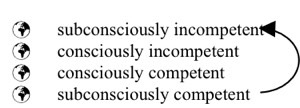Sign up for FlowVella
Sign up with FacebookAlready have an account? Sign in now
By registering you are agreeing to our
Terms of Service
Loading Flow

Acquiring
From the day we are born we train for cultural competence in every contact we have, even if we do not experience it in that way. Nevertheless, acquiring cultural competence starts at home, in particular in meeting new people.
Discussing their concept of cultural intelligence Thomas and Inkson outline a learning process in five steps: attention, retention, reproduction, reinforcement and being pro-active.
In more general terms we may look at different learning styles; e.g. observing what happens, trial and error, do what others tell you or start from knowledge.
You may also look at the learning process. It goes through the following four phases. If you go to another country and you do not know nothing about its culture or about dealing with cultural differences, you are subconsciously incompetent: you do not know how to deal with the other culture (incompetent) and you are also not aware of it (subconsciously).
When people start making remarks about your maladapted behaviour, you become aware of the problem (consciously) but you still have no idea on how to deal with it (incompetent).
You then have a series of options to become competent: have a beer with the locals, question yourself, read a book, follow a course and so on. The point is of course becoming competent; not a straightforward process but rather an iterative one . At that point you are continuously aware of how you try to adapt your behaviour, how to communicate differently and so on.
Only when you have found your own way for dealing with cultural differences, you can react more or less automatically to various situations; on autopilot or in terms of Thomas and Inkson the cultural cruise-control.
This process repeats itself over and over again, improving your cultural competence not only within one and the same foreign country but also in third countries. You learn what suits you in dealing with cultures.
